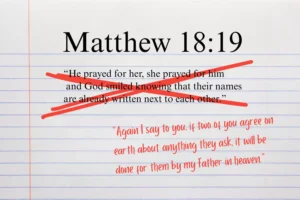My alarm erupted in song. I murmured, groaned. Then breathed out a long sigh. The bed sheets shuffled as I pulled the comforter over my head and rolled onto my side. I hate 7 a.m. Hate it. Despise it like a 6 year old hates broccoli.
But my alarm clock was persistent, even after my hand reached to press the snooze button a few times. I slid out of bed and stumbled over to my Bible, sat down on my cold and hard wooden chair, and peeled the Word open. I started to read.
Then I woke up three minutes later.
Another failure. Another stumble.
I Dare You
I have a dare.
Stop reading your Bible. Just close it, stand up and embrace the desert. Feel the heat and touch the dry ground. Step on the rocks and thorns known as confusion and chaos. Or put on your brown boots and slosh through muddy streams and thick marshes of the Land Without the Bible, which just so happens to be full of guilt and worldly entanglement. Yes, even explore the dark wooded areas where the lost begin their march.
You will find much in this journey.
But most of all, you will find out what time completely without the Word of God in your life looks like.
Do it. Just see it for yourself. I once did. And quite honestly, there are days I still do.
Dropping the Scriptures is brutal and blinding, and it leads directly to the grave. First Timothy 3:16-17 tells us,
“All Scripture is God-breathed and is useful for teaching, rebuking, correcting and training in righteousness, so that the servant of God may be thoroughly equipped for every good work” (NIV).
Deuteronomy 32:47 calls the Word “your very life.” We desperately need this Word.
However, I’ve also noticed that ignoring God’s Word can also lead to a deep and destructive guilt. I’ve heard the mantra time and time again, and heard it said a hundred times in hundreds of conversations, that your day will be bad if you don’t read your Bible. I’ve been wracked with this kind of guilt time and time again, ignoring the grace that the Lord has for me that can be found in His Word, degrading it to a simple “make-my-day-nice-and-happy” exercise.
I’m realizing I can’t put myself there. We must find ourselves in the glories of grace. The flowing streams that we’ve drunk from before are always there for us to walk to once more. Let’s drink deeply (see Psalm 1).
Don’t Fear Grace
For the proud sinner like me, grace can be a frightening thing. It means that I don’t have the power and control over the situation I so desperately want to cling to. I scratch and claw for power, but grace walks over and wrenches it from my hands.
And surprisingly that’s a beautiful and amazing thing, because if I kept the power and had the control, I would be doomed and destroyed. I can’t “do enough” on my own. Yet that’s not what I like to believe. I like to believe the lie that there is something I can do to add to my salvation.
So when I fail to spend enough time in the Bible, well, I beat myself up. I mope and sometimes believe that a missed quiet time has thoroughly ruined my day. That’s wrong. Totally and completely wrong.
Hang with me for a second. I’m not saying that we should throw our Bibles to the side or forget about obedience. Quite the opposite actually.
What I am calling for is a radical and tenacious pursuit of God — a heart change that leads to joy despite our failings and an exploding joy found in God’s Word.
I have a hard time remembering that reading God’s Word is not about me doing enough. We shouldn’t read the Scriptures because we’re afraid of not doing enough. Who we are is reflected in who Christ is. If we have Christ in us, God sees Christ and what He has done, not our failings. That’s an incredible relief for the worried and guilty heart. We must celebrate and rejoice, no longer living in fear of judgment and weighed down by guilt. This applies to all parts of our lives.
Fear Complacency
However, don’t for a second believe that we can fall into a pattern of complacency. There is no room for one who pushes the Bible to the side and rejects the Word of God.
John Piper once spoke about the morning he heard the voice of God:
If you would like to hear the very same words I heard on the couch in northern Minnesota, read Psalm 66:5-7. That is where I heard them. O how precious is the Bible. It is the very word of God. In it God speaks in the twenty-first century. This is the very voice of God. By this voice, he speaks with absolute truth and personal force. By this voice, he reveals his all-surpassing beauty. By this voice, he reveals the deepest secrets of our hearts. No voice anywhere anytime can reach as deep or lift as high or carry as far as the voice of God that we hear in the Bible.
It is a great wonder that God still speaks today through the Bible with greater force and greater glory and greater assurance and greater sweetness and greater hope and greater guidance and greater transforming power and greater Christ-exalting truth than can be heard through any voice in any human soul on the planet from outside the Bible.
The Bible is the story of redemption, the story of Jesus Christ. And He is the answer to all of our problems, all of our issues, all of our concerns. From Genesis chapter one to the final words of Revelation, we find a glorious and grand story that should mold and shape and form us into different people. People who have been broken by the fall, promised salvation and a coming King, struggling to find a messiah, and then gloriously seeing everything we’ve been waiting for in Christ and introduced into a kingdom that will never end.
So stop just reading your Bible; start understanding it. There is such glorious freedom in unlocking the heart of the Bible and finding the answer to all of our needs, because it is sufficient for all we need. Finding those answers isn’t always the easiest, but over time you learn how to sit down and actually study the Scripture. It can be done in simple ways:
1. Read the passage and ask yourself who wrote this passage? Who is he writing it to? Why is he writing it? Get the historical context down. Live in the first century or earlier as you look at the text, remembering that there was an original recipient of many of these texts. This is the context.
2. Spend time then in thinking and praying over what the author is trying to convey through the text. This will be the theme.
3. Turn your attention to the 21st century. Without changing or forgetting the original context, ask, “How does this Scripture apply to my life today?” You can use commentaries (which are books by scholars and pastors who have studied the Bible), or devotional books to help you work through the Bible on a daily basis. This is called application.
John MacArthur’s prayer is mine as well:
My prayer is that the magnificent and overwhelming theme of the redemption of sinners for the glory of God will carry every reader with captivating interest from beginning to end of the story. Christian — this is your story. It is from God to you — about you. It tells what He planned for you, why He made you, what you were, what you have become in Christ, and what he has prepared for you in eternal glory.John MacArthur Study Bible, “Introduction”
So stop reading your Bible — and start understanding it, loving it, digging into it. Pick up great books. (I recommend Spiritual Disciplines for the Christian Life by Donald Whitney.) You can ask your pastor or a trusted godly friend for recommendations. I’ve found so much fantastic help from family members and friends. They have encouraged me to journal, writing down answers to context, the theme and the application to my life. It’s not always easy work, but when I realize my need for the Bible, nothing can keep me from it.
Let’s reach forth and fight our way into its depths. Yes, there will be days of struggle and hardship, and we will forget and neglect that precious Word. But as our love grows for this book, we will find ourselves at the foot of the cross with our Bibles wide open, and our mouths and spirits rejoicing at the story of redemption and restoration each and every day.
It’s not something to miss.
Copyright 2011 Tim Sweetman. All rights reserved.











